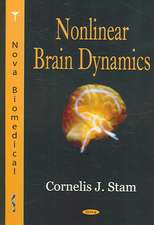Neurologic
Autor Eliezer Sternbergen Limba Engleză Paperback – 13 dec 2016
From bizarre dreams and hallucinations to schizophrenia and multiple personalities, the human brain is responsible for a diverse spectrum of strange thoughts and behaviors. When observed from the outside, these phenomena are often written off as being just crazy, but what if they were actually planned and logical?
"NeuroLogic" explores the brain s internal system of reasoning, from its unconscious depths to conscious decision making, and illuminates how it explains our most outlandish as well as our most stereotyped behaviors. From sleepwalking murderers, contagious yawning, and the brains of sports fans to false memories, subliminal messages, and the secret of ticklishness, Dr. Eliezer Sternberg shows that there are patterns to the way the brain interprets the world patterns that fit the brain s unique logic. Unraveling these patterns and the various ways they can be disturbed will not only alter our view of mental illness and supernatural experience, but will also shed light on the hidden parts of ourselves.
(With black-and-white illustrations throughout.)
"From the Hardcover edition.""
Preț: 127.11 lei
Preț vechi: 133.80 lei
-5% Nou
24.33€ • 25.33$ • 20.56£
Carte disponibilă
Livrare economică 18 februarie-04 martie
Specificații
ISBN-10: 0345807251
Pagini: 320
Dimensiuni: 132 x 203 x 18 mm
Greutate: 0.27 kg
Editura: Vintage Publishing
Descriere
A groundbreaking investigation of the brain s hidden logic behind our strangest behaviors, and of how conscious and unconscious systems interact in order to create our experience and preserve our sense of self.
From bizarre dreams and hallucinations to schizophrenia and multiple personalities, the human brain is responsible for a diverse spectrum of strange thoughts and behaviors. When observed from the outside, these phenomena are often written off as being just crazy, but what if they were actually planned and logical?
"NeuroLogic" explores the brain s internal system of reasoning, from its unconscious depths to conscious decision making, and illuminates how it explains our most outlandish as well as our most stereotyped behaviors. From sleepwalking murderers, contagious yawning, and the brains of sports fans to false memories, subliminal messages, and the secret of ticklishness, Dr. Eliezer Sternberg shows that there are patterns to the way the brain interprets the world patterns that fit the brain s unique logic. Unraveling these patterns and the various ways they can be disturbed will not only alter our view of mental illness and supernatural experience, but will also shed light on the hidden parts of ourselves.
(With black-and-white illustrations throughout.)
"From the Hardcover edition.""
Notă biografică
Cuprins
1. WHAT DO THE BLIND SEE WHEN THEY DREAM?
On Perception, Dreams, and the Creation of the External World
Filling in the Gaps . . . The Stuff That Dreams Are Made Of . . . Down the Rabbit Hole . . . A Vision for the Sightless . . . Luke Skywalker Lives in Your Temporal Lobe . . . A Corridor of Sound . . . The Dream Machine
2. CAN ZOMBIES DRIVE TO WORK?
On Habit, Self-Control, and the Possibility of Human Automatism
Zombies Among Us . . . Vision Without Seeing . . . Mice in a Plus-Maze . . . Focusing by Being Unfocused . . . How to Identify a Fake Smile . . . Why We Forget to Pick Up a Gallon of Milk . . . Why Do We Eat When We’re Not Hungry? . . . Executive Dysfunction . . . Murder on Autopilot . . . Two Systems for Multitasking
3. CAN YOUR IMAGINATION MAKE YOU A BETTER ATHLETE?
On Motor Control, Learning, and the Power of Mental Simulation
The Internal Simulator . . . Flexing Mental Muscle . . . PETTLEP . . . Insights from Stroke . . . How Do You Scratch a Phantom Itch? . . . Neuronal Mirrors . . . Why Is Yawning Contagious? . . . Empathy, Pornography, and the Autism Spectrum . . . Gut Feelings
4. CAN WE REMEMBER THINGS THAT NEVER HAPPENED?
On Memory, Emotion, and the Egocentric Brain
A Web of Snapshots . . . The Brains of Rival Sports Fans . . . Why Do We Remember Where We Were on 9/11? . . . Brains in Midtown and Downtown . . . Ignorance Is Bliss . . . “It’s Not a Lie If You Believe It” . . . Fairy Tales in the Confabulating Brain
5. WHY DO PEOPLE BELIEVE IN ALIEN ABDUCTIONS?
On Paranormal Experience, Narrative, and the Development of Strange Beliefs
“I Was Abducted by Aliens!” . . . Sleep Paralysis . . . Afraid of Your Shadow? . . . Conversations with God . . . The Walking Dead . . . Cheating on Your Wife—with Your Wife? . . . Visions from the Brink . . . Fighter Pilots and Heart Attack Victims . . . Hostage Hallucinations . . . Attack of the “Old Hag”
6. WHY DO SCHIZOPHRENICS HEAR VOICES?
On Language, Hallucinations, and the Self/Nonself Distinction
Whispers from the Microphone . . . “He Can’t Speak If I Interrupt Him” . . . “Someone Else Is Speaking Whenever I Speak” . . . How Are People Similar to Electric Fish? . . . System Failure . . . Can the Deaf Hear Voices in Their Heads? . . . A Disorder of Self-Monitoring . . . Why Can’t You Tickle Yourself? . . . Déjà Vu
7. CAN SOMEONE BE HYPNOTIZED TO COMMIT MURDER?
On Attention, Influence, and the Power of Subconscious Suggestion
You Are Getting Very Sleepy . . . The Cocktail Party Effect . . . Overcoming the Stroop Effect . . . Eat Popcorn, Drink Coca-Cola . . . Invisible Faces . . . Brand Names in the Brain . . . When the Brain Makes Excuses . . . “The Knife Went In” . . . One Brain, Two Systems
8. WHY CAN’T SPLIT PERSONALITIES SHARE PRESCRIPTION GLASSES?
On Personality, Trauma, and the Defense of the Self
Finding One Self . . . A Brain Divided . . . See No Evil . . . The Fragmentation of the Mind . . . The Hypnotist Within . . . An Eye for an I . . . NeuroLogic
Appendix: Maps of the Brain
Acknowledgments
Notes
Bibliography
Index
_






















